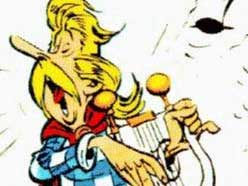| Title | Cacofonix |
| Category | Important Characters |
| Mangaka | nothing entered |
| Read Online | nothing entered |
Cacofonix is the village bard. He is usually only a supporting character, but has a major part in the plots of some albums (see Asterix and the Normans, Asterix the Gladiator, Asterix and the Magic Carpet and Asterix and the Secret Weapon). He loves singing and playing his lyre, and jumps at every opportunity to do so. He also plays the bagpipes, drum and a Celtic trumpet resembling a boar called a Carnyx. While he can accompany traditional dances, and conducts a village band, his singing is unbearable. In Asterix and the Normans it is so unbearable that it teaches the fearless Normans the meaning of fear. In recent albums his music is so spectacularly horrible that it actually starts thunderstorms (even indoors), because of an old French saying that bad singing causes rain.
For his part, Cacofonix considers himself a genius and a superb singer, and he is angrily offended when people criticize his singing, to the point of dismissing them as barbarians.
Some villagers go to extreme lengths to avoid hearing Cacofonix’s music. Most notably, Fulliautomatix, the village smith, bangs him on the head at the merest hint of breaking into a song, and has destroyed his lyre on a number of occasions, at one point being called the “ancestor of music critics”. As a running gag, Cacofonix is generally tied up and gagged during the banquet at the end of most albums to allow the other villagers to have a good time without having to keep him from singing. He is nonetheless well liked when not singing.
In contrast to the villagers, some of the younger outsiders whom Cacofonix has met do appreciate his “talent”: Justforkix (in Asterix and the Normans) actually encouraged Cacofonix to think seriously about moving to Lutetia where he claimed the bard’s way with music would be enjoyed; Pepe (in Asterix in Spain) liked it because it reminded him of home (the goats bleating in his village); and Princess Orinjade (in Asterix and the Magic Carpet) expressed similar enthusiasm, though it was perhaps in gratitude for his music having saved her from being sacrificed.
Unlike the other villagers, whose huts are on the ground, Cacofonix’s hut is perched up in a tree. Ostensibly this is so that he can act as a lookout to warn the other villagers of imminent invasion, but the real reason is to let him practise his music as far from everyone as possible: it is a tall tree! It has been felled several times but has been replanted, or restored by Getafix’ magic acorns (in The Mansions of the Gods).
In the English and American adaptations of the series, he speaks in a effeminate voice.
He and Getafix are the village’s teachers, as only bards and druids are allowed to teach in school. He is rarely seen fighting the Romans except when his personal honour is impugned – his voice apparently does not mix well with the magic potion, although in Asterix and the Magic Carpet it actually restores him to full voice. The fact that he is incredibly arrogant may also be partly to blame, as in at least one volume (Asterix and the Roman Agent) he is shown to have not even noticed the other villagers are fighting the Romans and is actually shown asking Getafix what’s going on (However, he had been suffering from a lost voice earlier in this volume and may have simply been staying in his hut while waiting to recover).
- French: Assurancetourix (Assurance tous risques” meaning “comprehensive insurance”) – also in Spanish (Asuranceturix), Catalan (Assegurançatórix), Italian, Portuguese and original Dutch translations.
- In English, Cacofonix is derived from cacophonic (describing “harsh and unpleasant sounds”), from Greek κακός (kakos, meaning bad) and φωνή (phoni/phone, meaning voice). In the American version of the series,he was called Malacoustix, which refers to “bad acoustics”. In the English dub of the film Asterix the Gaul he is called Stopthemusix (a pun on the phrase “stop the music”) and in the American dub of the Asterix and the Big Fight film he is called Franksinatrix (a pun on Frank Sinatra).
- In Greek he is Κακοφωνίξ (Cacofonix) and in new Dutch translations Kakofonix, Kakofoniks in Polish and Turkish.
- In Serbian, his name is Тамбурикс (Tamburiks, Tambourix). The name comes from tambura. He doesn’t actually play a tambura, but the instrument is very popular in Serbia. Tamburati (to play tambura), interestingly enough, is a Serbian slang meaning “to beat someone up”. At the end of many albums, Tamburiks often gets beaten up, gagged and tied to a tree.
- In German and Swedish, he is Troubadix; In Danish, Norwegian and Finnish Trubadurix (a pun on “Troubadour” / “trubadur”, a word for bard).
- In the Brazilian translation he is Chatotorix (meaning “annoying” or “the very dull one”).
- In Hindi translation he is गवैयाँ बेसुरीक्स (Gavaiyañ Besurix) (meaning “one who sings out of tune”)
- In Bengali this bard is known as (“kawlorobix”) – the root being (“kawlorob”) – meaning “making a lot of noise for no purpose”
- In Hungarian translation he is “Hangjanix”, which means “He absolutely has no voice”.
- Similarly, the Esperanto name Malmuziks means “the contrary of music”.
- In Hebrew, חמשיריקס (Khamshirix) which can be literally translated back as ‘Limerix’ (from Limerick).
- In Icelandic he is Óðríkur, meaning “Rich in Odes”. A music-making competition in one of Iceland’s most prestigious pre-colleges is named in his honour.
- In Welsh, he is Odlgymix, from odl gymysg (mixed rhyme, a metre of Welsh verse).
- In Sinhalese – In සිංහල “Caco Pappa” similar to Cacofonix
- In Latin, he is Cantorix, from canto – to sing.

